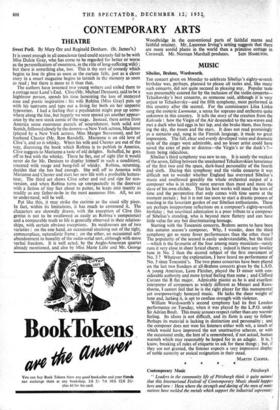MUSIC
Sibelius, Brahms, Wordsworth.
Tie concert given on Monday to celebrate Sibelips's eighty-seventh birthday was, perhaps, planned to please all tastes and, like many such concerts, did not quite succeed in pleasing any. Popular taste was presumably catered for by the inclusion of the violin concerto-- Tchaikovsky 's best concerto, as someone said, although it' is very unjust to Tchailcovsky—and the fifth symphony, most performed in this country after thb second. For the connoisseurs Liisa Linko sang the esoteric Luonnotar, a scena for soprano and orchestra quite unknown in this country. It tells the story of the creation from the Kalevala : how the Virgin of the Air descended to the sea-waves and met a duck who laid eggs in her lap, and she broke them, thus form- ing the sky, the moon and the stars. It does not read promisingly as a scenario au0, sung in the Finnish language, it made no great impression. The full, clear and evenly developed voice- and dramatic style of the singer were admirable, and no lesser artist could have saved the cries of pain or distress—the Virgin's or the duck's ?- from being ridiculous.
Sibelius's third symphony was new to me. It is surely the weakest of the seven, falling between the unashamed Tchaikovskian luxuriance of the first two and the spare, dark-hued personality of the fourth and sixth. During this symphony and the violin concerto it was difficult not to wonder whether England has overrated Sibelius's music and swallowed greedily the whole orchestral output of a composer who is in reality more uneven than most and more the slave of his own cliches. That his best works will stand the tests of time and the perspective. that only comes with time seems at the moment certain ; but it is not too soon to start a drastic process of weeding in the luxuriant garden of our Sibelian enthusiasms. These are perhaps inopportune reflections on a composer's eighty-seventh birthday ; but uncritical admiration is a poor tribute, to a composer of Sibelius's standing, who is beyond mere flattery and can have little value for any but discriminating homage.
Starting with the Toscanini concerts, Brahms seems to have been this autumn season's composer. Why, I wonder, does the third symphony get so many fewer performances than the other three ? The popularity of the second is easily understandable, but the third —which is the favourite of the four among many musicians—surely runs it very close in sheer lyrical charm ; indeed is there any lovelier tune in No. 2 than the second subject of the first movement of No. 3? Whatever the explanation, I have heard no performance of No.3 since Toscanini's. The two piano concertos have--been played on the last two Sundays at all-Braluns concerts given by the L.S.O. A young American, Leon Fleisher, played the D minor with con- siderable authority and more lyrical feeling than some ; and Clifford Curzon the B flat major. Adtmirable pianist as he is and excellent interpreter of composers as widely different as Mozart and Raws- thome, I cannot feel that he is the right player for this monumental yet overpoweringly honeyed music. He lacks the sheer weight of tone and, lacking it, is apt to confuse strength with violence.
William Wordsworth's second symphony had its first London performance on Tuesday, when it was played by the L.P.O. under Sir Adrian Boult. This music arouses respect rather than any warmer feeling. Its idiom is not difficult, and its form is easy to follow. Perhaps its material is lacking in distinction and personality ; and the composer does not woo his listeners either with wit, a touch of which would have improved the not unattractive scherzo, or with the occasional smile, the hint of a remembered, if not actual, human warmth which may reasonably be hoped for in an adagio. It is, I know, breaking all rules of etiquette to ask for these things ; but, if they are not'granted, the listener expects a very impressive display of noble austerity or stoical resignation in their stead.
MARTIN COOPER.


































 Previous page
Previous page